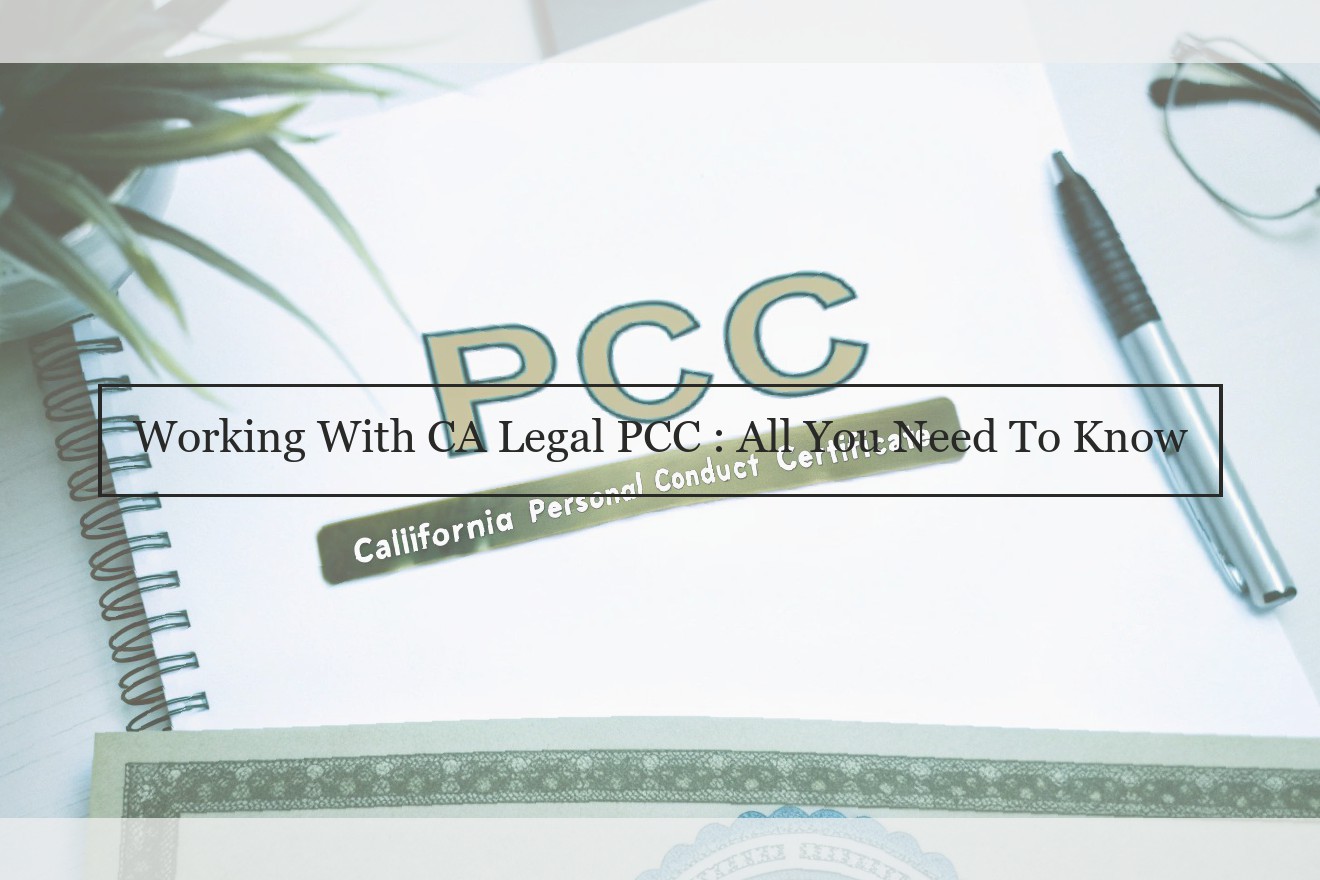What Is A CA PCC?
Personal Conduct Certificate, or PCC signifies that the information contained in a criminal history record does not indicate any felony conviction. A Personal Conduct Certificate is not an expungement of criminal records. It is merely the California Department of Justice’s (or the FBI’s if you need a federal clearance) statement that no indication of a felony conviction exists in their records.
The Personal Conduct Certificate is primarily utilized by individuals who have been arrested and/or convicted of a felony in California and have since set aside that conviction via a California Penal Code § 1203.4 expungement order.
But at times , an expungement order is not adequate, and a person requires official written verification that he or she has no felony convictions on his or her record. A personal conduct certificate provides such verification, and is often utilized by students, contractors, and other professionals who must attain and maintain security clearances to perform their work.
Requirements To Obtain A CA PCC
Legal Requirements for Obtaining a Legal PCC in California
When applying for a Personal Caregiver Certificate or while working as a caregiver in California, it is imperative to comply with all the legal requirements. This ensures that both the individual and the employer, usually the patient’s family members or relatives, understand the responsibilities associated with the role.
The initial step in obtaining a California Legal PCC involves filing a form that verifies your understanding and agreement to follow the rules and responsibilities outlined by the California Department of Public Health (CDPH). The form includes a "Declaration" that the individual is knowledgeable about and intends to adhere to the applicable laws and regulations.
In addition to submitting the Declaration, individuals must provide certain birth, residence, and identification documentation to be reviewed and verified. For example, you may be required to show proof of your place of birth with documents such as a copy of your driver’s license, Social Security card, or form of photo identification with your date of birth.
The information provided to CDPH is designed to ensure a criminal background check can be conducted to ensure individuals do not have a history of violent or sexual crimes. If criminal convictions have ever occurred, appropriate certifications that detail the nature of the conviction will need to be provided. As an applicant, it is essential to know what is required, as this can save time and fees in the future. In some instances, you may be disqualified from being able to become a caregiver, depending on the criminal background.
Once applicants are approved as California PCCs, the certificate must be renewed by the individual every two years. In addition, employers must ensure individuals are re-evaluated and certified every three years.
In addition to meeting the requirements for education, criminal background, and renewal, it is also essential that California Personal Caregiver Certificate holders comply with all legal requirements for the job. This includes completing 5 hours of specific training regarding important skills needed for the profession.
Steps For Getting A CA Legal PCC
Steps to Apply for a California Legal PCC
The next step after you have decided on the "Right Mark" for your California PCC is to apply for registration of the proposed name with the California Secretary of State, and to file your registration statement with the domestic insurance company. To do so, you will need to complete two forms: (1) a California State Statement of Policyholder and (2) an Application to Register or Continue Registration of the proposed name.
The California Statement of Policyholder form (IPME-17) is available on the Department of Insurance’s website. The completed IPME-17 form must be signed by a California domestic insurer authorized to write the line of insurance you wish to propose for the California PCC. In other words, the Statement of Policyholder must be signed by a California domestic insurer who currently writes the line of insurance you wish to have the California PCC write. Please note that a California ceding company means a California domestic insurance company that cedes or transfers risk to the California PCC through a reinsurance agreement. Some reinsurance agreements may need prior approval by the California Controller before a statement of policyholder can be completed and filed. The Statement of Policyholder must include a statement evidencing an intent to engage in the insurance business through the proposed name and a statement acknowledging the domestic insurer named in the form has authorization to transact in California the line of insurance to be written by the California PCC.
The Application to Register or Continue Registration form (PCT-1) is available on the Department of Insurance’s website. Unlike the Statement of Policyholder which must be signed by a California domestic insurance company, the Application to Register or Continue Registration to be used for filing under the California PCC program is separate from the insurer. Note, however, that the California PCC is not available for any line of business transacted by a California admitted insurer or for any line of business for which a California admitted insurer is the ceding company. If the application is for registration renewal, attach an endorsement (amendment) to the existing agreement. Submit the completed forms to the California Department of Insurance, Office of the General Counsel, 300 South Spring Street, Los Angeles, CA 90013, via certified mail, overnight delivery service, or messenger/hand delivery.
Once the forms have been filed with the Department of Insurance, the Department will review the application and notify you in writing of its approval. The Department will more than likely review the application in about two weeks. If the California PCC has agreed in the cover agreement to pay any premium(s) in advance, the Department does not issue a letter of approval until the first premium has been released to the California PCC by the ceding company. If there is a difference of opinion regarding the application, a public hearing will be held on the application. If there is a disagreement on an issue of an application, the Department will not approve the application until all issues are resolved or withdrawn.
The Benefits For Holding A CA PCC
The legal PCC can be advantageous for a variety of reasons. This may prove especially true if someone is seeking employment. For those most in need for PCCs, a legal PCC could make it easier to gain employment without the negative stigma attached to the red mark for criminal convictions on an otherwise clean rap sheet. In some cases, however, clients are surprised that after a legal PCC has been granted, the employer still insists on seeing the rap sheet in determining who to hire. There is no law that prohibits employers from requesting such information.
It might also be useful when obtaining a necessary state or federal certificate, license or permit. In other words , individuals may be able to use the legal PCC to convince the licensing board to overlook a criminal conviction that would otherwise disqualify a person from obtaining a certificate or permit.
In California, those anticipating being denied housing due to a prior criminal conviction can also benefit from a legal PCC. Under the state’s Penal Code 432.7, public and private employers cannot refuse to hire someone based solely on a prior felony conviction. However, this rule does not extend to refusals of housing on the same principles. As such, people in this situation may want to consider applying for a legal PCC before seeking housing.
Typical Problems With A CA PCC
Common mistakes made in California legal PCC applications include overlooking the fine details such as verifying all information, ensuring documents are complete and notarized, and submitting documents in the correct order. The latter is especially important, as California law requires a specific application order that starts with the criminal record history report through the backward-looking search to the front. Missteps in this area can cause the certification process to take longer than necessary or lead to the rejection of your application, making you start over from scratch.
Another common mistake is failing to communicate with the bank. You must provide your bank with a special notary that provides specific instructions for preparing the notary for your document. This commonly leads to banks rejecting customers notaries because they are not prepared properly. In these cases, a second notarization is necessary, which will delay the application process.
Expert Advice For A CA Legal PCC
To avoid delays in the approval process, applicants should pay careful attention to the following items:
- Use the California Medical Board of California PCC application. The PCC application can be found at the Medical Board’s website and instructions are on the first page of the application.
- Ensure that all of your responses on the PCC application are legible. You may have to print the application out and then hand write responses (other than the signature block).
- Have all of your prior employers and references listed on the application , even those employers and references not contacted by the Medical Board.
- Ensure that you answer all of the questions on the PCC application. Do not leave anything blank. Typically an applicant would respond to a question with either yes or no. If you do not know the answer to a question, you should state, "unknown" or "do not recall."
- Search your personal records to find information you need. If you have lost your diplomas, degrees or transcripts, you can obtain replacement copies.



+ There are no comments
Add yours